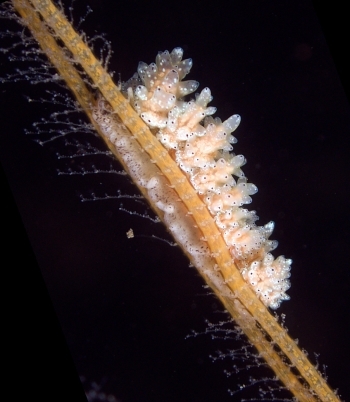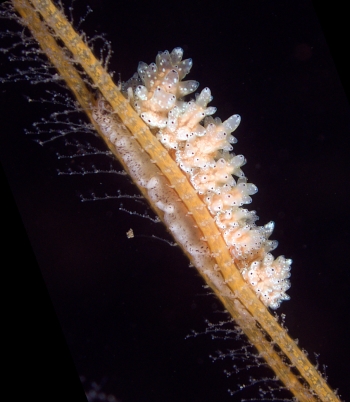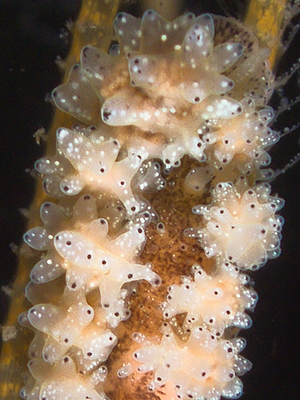
Doto pinnatifida
(Montagu, 1804)
Order: NUDIBRANCHIA
Suborder: DENDRONOTINA
Family: Dotidae
DISTRIBUTION
Quite common in the British Isles. Also reported from northern Spain and southern Norway.
PHOTO
Locality: Barmore Island, Loch Fyne, 12 m, Scotland, NE Atlantic, 31 August 2008, Boulder slope in sea loch. Length: 30 mm. Photographer: Jim Anderson.
The animal is a translucent cream or pinkish colour with dark brown or blackish mottling dorsally, usually more concentrated at the front of the body. There are a number of simple tubercles along each side of the body, each with a black tip. The cerata are large and have up to 6 circlets of tubercles, each tubercle having a black spot at its tip.
For the genus Doto pinnatifida is a relatively large species, growing to about 30 mm in length. It feeds exclusively on the calyptoblastic hydroid Nemertesia antennina.
-
Picton, B. E. and Morrow, C. C. (1994) A Field Guide to the Nudibranchs of the British Isles. London, Immel Publishing Ltd. 143pp.
-
Thompson, T. E. (1988) Molluscs: Benthic Opisthobranchs (Mollusca: Gastropoda). Leiden, The Linnean Society of London. 1-356.
Rudman, W.B., 2008 (September 23) Doto pinnatifida (Montagu, 1804). [In] Sea Slug Forum. Australian Museum, Sydney. Available from http://www.seaslugforum.net/find/dotopinn
Related messages
Doto pinnatifida from Scotland
September 23, 2008
From: Jim Anderson

Concerning message #6190:
Dear Bill,
Here is Doto pinnatifida - Another 'new' species for me last month. Identified for me by Bernard Picton.
Locality: Barmore Island, Loch Fyne, 12 m, Scotland, NE Atlantic, 31 August 2008, Boulder slope in sea loch. Length: 30 mm. Photographer: Jim Anderson.
Water temperature 13 deg C.
Kind regards,
Jim A
jander4454@gmail.com



Thanks Jim,
It's always good to be able to add a 'new' species to the Forum. The numerous species of Doto found in the north Atlantic, all very similar in appearance, are a lesson to anyone trying to identify species of Doto from less well-known faunas. There are probably many more species then we realise.
Best wishes,
Bill Rudman
